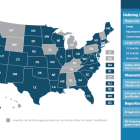
OP-ED: Reflecting on the Past, Planning for the Future of Juvenile Justice and JJDPA
|
Anniversaries are a time to celebrate, but also to look back and reflect on where we’ve been and where we are going.
Juvenile Justice Information Exchange (https://jjie.org/page/267/)

In late September, Torri was driving down the highway with her 11-year-old son Junior in the back seat when her phone started ringing.
It was the Hamilton County Sheriff’s deputy who worked at Junior’s middle school in Chattanooga, Tennessee. Deputy Arthur Richardson asked Torri where she was. She told him she was on the way to a family birthday dinner at LongHorn Steakhouse.
“He said, ‘Is Junior with you?’” Torri recalled.
Earlier that day, Junior had been accused by other students of making a threat against the school. When Torri had come to pick him up, she’d spoken with Richardson and with administrators, who’d told her he was allowed to return to class the next day. The principal had said she would carry out an investigation then. ProPublica and WPLN are using a nickname for Junior and not including Torri’s last name at the family’s request, to prevent him from being identifiable.
When Richardson called her in the car, Torri immediately felt uneasy. He didn’t say much before hanging up, and she thought about turning around to go home. But she kept driving. When they walked into the restaurant, Torri watched as Junior happily greeted his family.
Soon her phone rang again. It was the deputy. He said he was outside in the strip mall’s parking lot and needed to talk to Junior. Torri called Junior’s stepdad, Kevin Boyer, for extra support, putting him on speaker as she went outside to talk to Richardson. She left Junior with the family, wanting to protect her son for as long as she could ...

Anniversaries are a time to celebrate, but also to look back and reflect on where we’ve been and where we are going.

To its detractors, the curfew represents “virtual house arrest.”

Mandatory minimum sentences are completely incompatible with how juvenile court works. When a youth has committed an offense, juvenile court judges tailor sanctions to best meet a youth’s unique needs for rehabilitation by weighing a comprehensive set of factors, including the severity of the crime, the statement of the victims, and the circumstances of the youth’s life — including mental health issues and experience with abuse, homelessness and extreme poverty.

Taylonn Murphy and Derrick Haynes know all about the pain of early graves. Both have lost family in a blood feud between the West Harlem projects where NYPD conducted a gang raid last week.

It’s pretty simple really. When someone is doing something we don’t like we often develop a view of them as an enemy, or at least someone to be looked upon with contempt.

A quarter of state-level agencies across the country do not currently collect or report juvenile recidivism data, according to a recent survey conducted by the Pew Charitable Trusts, the Council of Juvenile Correctional Administrators and the Council of State Governments.

Manhattan District Attorney Cyrus Vance today defended the police action that resulted in mass arrests last week at two housing projects in Harlem.

The My Brother’s Keeper Mentoring Campaign gains support from the Office of Juvenile Justice and Delinquency Prevention.